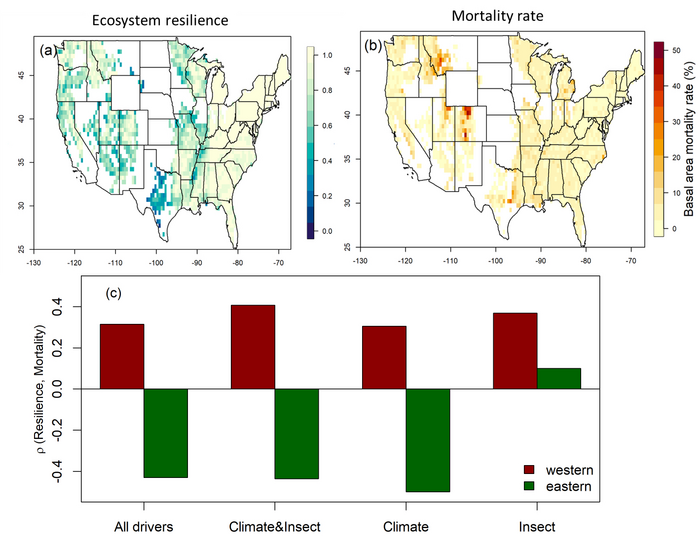A forest’s resilience, or ability to absorb environmental disturbances, has long been thought to be a boost for its odds of survival against the looming threat of climate change.

Credit: Xiaonan Tai/NJIT
A forest’s resilience, or ability to absorb environmental disturbances, has long been thought to be a boost for its odds of survival against the looming threat of climate change.
But a new study suggests that for some Western U.S. forests, it’s quite the opposite.
In the journal Global Change Biology, researchers have published one of the first large-scale studies of U.S. forest land exploring the link between forest resilience and mortality.
The study is based on more than three decades of satellite image data used for assessing forest resilience, and more than two decades of ground observations of forest tree death across the continental United States.
The results show that while high ecosystem resilience correlates with low mortality in eastern forests, it is linked to high mortality in western regions.
“It’s a surprising finding. … It was widely assumed that greater forest resilience indicates lower mortality risk, but this relationship hadn’t been rigorously evaluated at such a large scale until now,” said Xiaonan Tai, assistant professor of biology at New Jersey Institute of Technology and the corresponding author.
Researchers say the unexpected resilience–mortality relation in Western U.S. forests could be driven by regional factors such as insect population dynamics, resource competition and drier climates that favor long-term plant trait acclimation for drought resistance over resilience to extreme climatic events.
The findings have implications for future predictions of forest mortality events in response to climate change, according to the paper’s authors.
“With the increasing wealth of satellite remote sensing data and satellite-based diagnostics of ecosystem health and resilience, we found it critical to compare these diagnostics to ground-based measurements of forest health such as tree mortality rates,” said Anna Trugman, a co-author of the study and assistant professor at University of California, Santa Barbara’s Department of Geography. “This study points out a need for future research to bridge a gap between satellite data and measurements researchers are capable of making on the ground, such as tree mortality.”
“It really hits home that we can’t expect remote-sensing estimates of resilience to predict mortality, which has been assumed in many studies,” added William Anderegg, co-author and associate professor and director of the Wilkes Center for Climate Science and Policy at University of Utah. “It’s a very important message for the field to hear.”
In their study, the team combined biweekly time series of satellite imagery and climate data from 1982-2010 to derive ecosystem resilience, using vegetation metrics such as the Normalized Difference Vegetation Index (NDVI), which are key indicators of vegetation greenness and biomass.
“These vast data sets show us that resilience is consistently higher in forests with wetter climate with denser trees for both eastern and western forests,” explained Tai. “This supports past research indicating that forests tend to be more resilient in wetter climates increases with higher water availability, which could aid recovery after a disruption the ecosystem.”
The team compared the resilience data with over 1.5 million ground surveys of tree death observations from the U.S. Forest Inventory Analysis (FIA), highlighting instances of forest mortality caused by extreme changes in climate or other ecological factors such as insect outbreaks.
While the study indicates the highest mortality rates in recent decades occurring in states of Colorado, Montana, Utah, California, and Texas, Tai says that Western U.S. forests at colder and wetter elevations — such as the Rocky Mountain Region’s high-elevation forests for example — are closer to the tipping point for tree mortality.
“These conditions support large populations of bark beetles and other harmful insect, making them much more susceptible to major outbreaks, which we found to be a major driver of tree death,” said Tai.
“Another factor we think is at play is resource competition. … Unlike forests in persistent drier western climates that have adapted to harsh conditions over a very long time, the competition for water may be too harsh for denser forests out west experiencing sudden climate changes that drive drought conditions.”
The team’s findings suggest satellite-based resilience metrics can still be useful for climate scientists predicting forest mortality for Eastern U.S. regions where the positive resilience-mortality correlation holds, by as much as ten years out.
However, Tai says the new findings also call for a revaluation of large-scale predictions for how climate change is impacting forests more globally, which have become increasingly reliant on satellite-generated resilience maps as proxies for forest fate.
“The takeaway is that this key relationship for studying forest health is more complex than imagined, so how we assess these ecosystems’ response to climate change requires more nuance going forward,” said Tai.
…
Tai, X., Trugman, A. T., & Anderegg, W. R. L. (2022). Linking remotely sensed ecosystem resilience with forest mortality across the continental United States. Global Change Biology, 00, 1–10. https://doi.org/10.1111/gcb.16529
Journal
Global Change Biology
DOI
10.1111/gcb.16529
Article Title
Linking remotely sensed ecosystem resilience with forest mortality across the continental United States
Article Publication Date
5-Dec-2022




